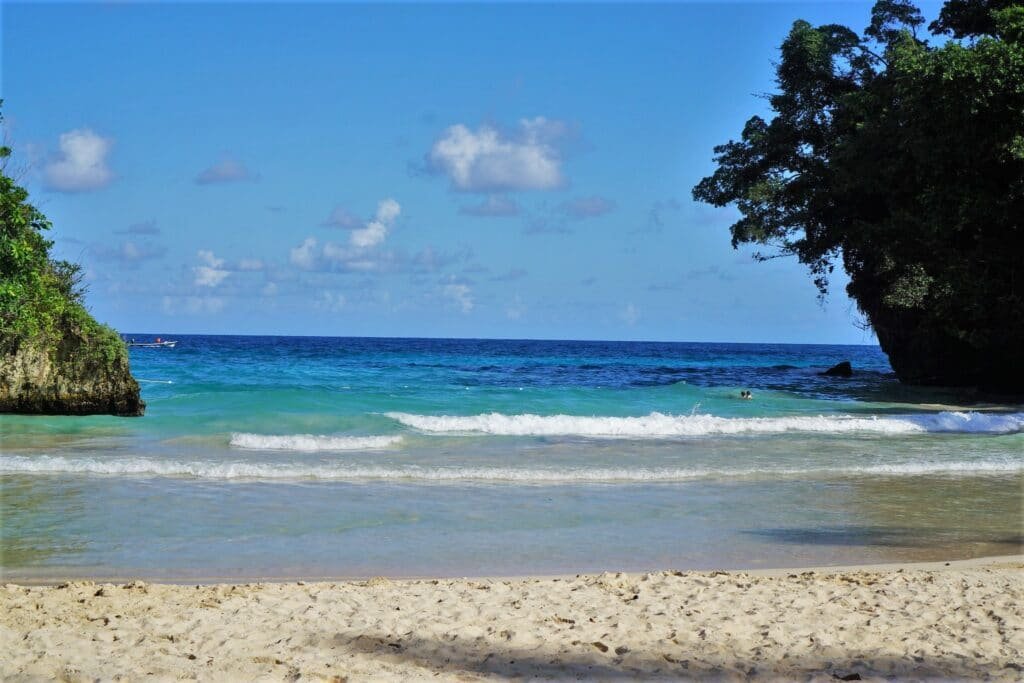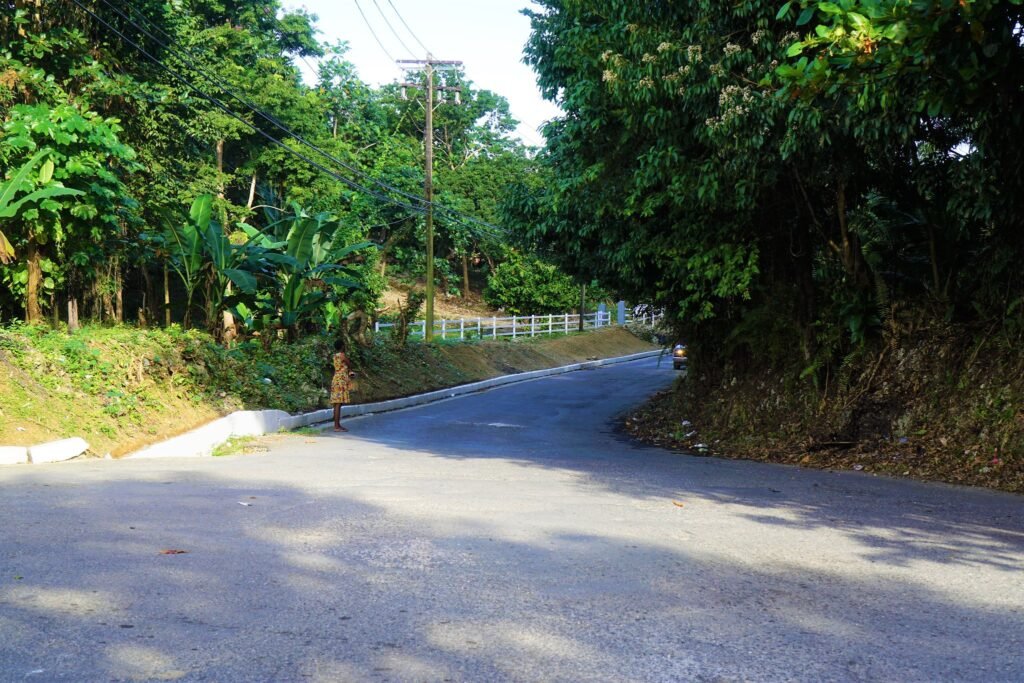As we wrote in our Kingston post, our first instinct when planning a trip to Jamaica in 2017 was to avoid what most tourists consider to be essential Jamaica – Negril, Montego Bay, and Ocho Rios. We opted for the less touristy and less developed Northeast Jamaica and didn’t regret it for a second. Rather than spending our time sipping Mai Tais and eating buffet food at the resort, we wanted to explore local beaches and regional culture.
We visited a few beaches in Northeast Jamaica, such as Frenchman's Cove, Boston Bay, and Winnifred. In general, the beaches had a few things in common – they were far less packed than touristy beaches, quiet and picturesque, consisting mostly of local families and only a few tourists in between. Delicious fresh local food was served in abundance, fish just caught from the sea cooked right on the beach, regional delicacies such as plantains, breadfruit, festival dumplings fried up in large sizzling pans, shacks in Boston Bay serving up authentic jerk chicken, slowly cooked over giant grills. However, one of the problems that we encountered on almost all of these lesser-known public beaches was litter and debris. While there is a public awareness program for Jamaicans not to litter and pollute their beaches, a lot of work still needs to be done in this direction. Besides natural debris such as seaweed, the beaches were often plagued with strewn plastic bottles, cigarette butts, and various picnic leftovers. The sharp contrast between the natural beauty of these beaches and the lack of protection and maintenance was quite disheartening. International chain hotels can afford to keep their beaches clean, but unfortunately, the beaches of Northeast Jamaica, the true national treasures of the island, are being neglected. We ended up spending most of our time at Frenchman Cove, where due to a steep entrance fee of $10, the beach was cleaned daily.


But the biggest story was how we made our way to and from these beaches every day. We stayed in a small Airbnb by Port Antonio in a residential area, within walking distance of Winnifred Beach. There is one two-lane road winding down the coast, past Port Antonio town center to every beach on the coast. There are no buses or other public transportation, and the only way to get a ride is to wait on the curbside for a passing taxi. The taxis in Jamaica are regular cars that can be identified by red-colored license plates and not much else. Now, these are taxis in name only; in reality, they function as small minibusses – filling up every seat to capacity, picking up and dropping off passengers along the way. A few are older vans, most are sedans, and the cost per person is about a dollar to any nearby beach. Every morning, we would stand by the road, swimsuits and towels in a backpack, waiting to see what adventure awaited us today. If we were lucky, a moderately clean car with a red license plate and one passenger in the front seat would stop to take us to our destination. If we were luckier, something weird would have happened, as it inevitably did.
On the second day, we had been waiting for a taxi for over fifteen minutes, with almost no cars coming down the road in the correct direction, when a small, thoroughly rusted-out car came clanking towards us. Its brakes screamed as it eased off the road to stop next to us. It did not have a red license plate. The driver, seemingly still in his teenage years, had to climb into the passenger seat to push the passenger door open by leaning on it with his shoulder.
“Where to?” he asked, panting. The car didn’t have air conditioning.
Victor and I looked at each other. And then, not for the first or for the last time in our travels, we threw caution to the wind. We got into the car and gave him two dollars. Fifteen bouncing, screeching, and sweating minutes later, we were dropped off at our destination. To this day, I don’t know why we didn’t wait for an official taxi, and if you are ever in the same predicament, I recommend you do. It wasn’t very smart of us, and we fully expect you to do better. We told each other we would do better. We would only get into official taxis from now on, just to be safe. So, keep in mind when you read the following stories – all of these happened in official, government-sanctioned taxis.
The next taxi we got into had a very happy-looking woman with a lot of bags in the back seat. She greeted us warmly, and I scooted in next to her, while Victor took the front seat. A few minutes into the journey, I heard a distinct scratching sound. I looked at the woman, she looked at me. Victor, from the front seat, glanced back at me as well. The scratching sound intensified, along with a rustling noise. Victor twisted in his seat and stared at me suspiciously. I looked back at him dumbfounded.
“Chicken!” the woman next to me announced, pointing at one of the bags.
“A live chicken?” I asked, even though this clarification really wasn’t needed as I could clearly see the bag was moving.
“Not for long!” she laughed. The chicken in the bag loudly clucked.
A few hours later, at the beach, we decided to forgo jerk chicken, instead feasting on festival fried dough and giant shrimps, in honor of our unexpected taxi companion.

The next day, a taxi passing us while going in the wrong direction quickly slowed down and made a U-turn to pick us up. The car was newer, clean, and the driver was very friendly. We told him our destination, and as soon as we made ourselves comfortable in the back seat, he made another U-turn and started driving in the same direction he was going before picking us up. Seeing our confusion through the rearview mirror, he quickly explained that he has a “regular”, a very nice woman, who lives just a few minutes down the road and counts on him to pick her up every day to go to work. We were in no rush and agreed that he couldn’t possibly let her down on account of us. “A few minutes down the road” turned into a full ten-minute drive towards the farthest destination we have been to so far, but the woman was just as nice as promised. She was an older, grey-haired woman, very neatly dressed, who cheerfully chatted with our driver the entire ride, occasionally turning to us and commenting on what a “good boy” he is. We, of course, enthusiastically agreed.
Another time, no sooner than we approached our familiar improvised “taxi stop” on the main road, a large van stopped immediately, and a grinning young driver jumped out. He rolled the van door open, and we were faced with a completely jam-packed van of people, no less than nine faces staring at us inquisitively. It looked like several people were already sitting on each other’s laps. I took an instinctive step back.
“There is no room at all…” I said to Victor.
“Maybe he is dropping people off here,” Victor said, and for a minute, it did look like he was right. The driver started pointing at people and ushering them out of the van. Once a few people were out, he redirected a few people to scoot even closer together, stacked some people on top of them, sat a child basically on the back window, slid out a plank from underneath one of the seats thus creating an extra make-shift bench, shoved all the passengers back into the van, and directed Victor and me into two suddenly empty seats. The whole operation looked like human Tetris. As I sat down on my unexpectedly roomy seat, I felt that I had to apologize to the rest of the passengers for this intrusion into their already uncomfortable commute. But as I looked around, no one looked unhappy or disturbed. Everyone was smiling, and a few people were chatting. This was clearly not out of the ordinary for them at all. While this was pretty extreme for us, we encountered this type of overflowing taxi on the road almost daily, and despite the heat and overcrowding, everyone seemed satisfied with this arrangement.
Every single trip to a “wild beach” in Jamaica was a unique story to remember. Stay tuned for more Jamaica stories in the next post: An Unexpected Companion at the Beach or The Real Story of Drugs in Jamaica.


